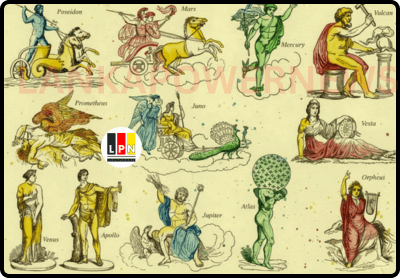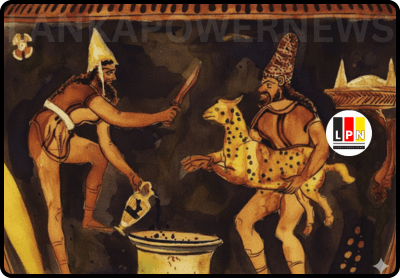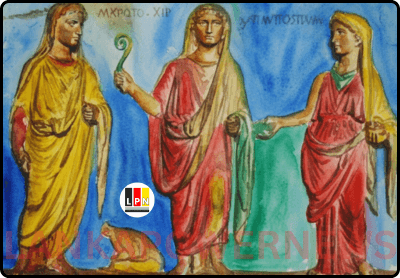Roman Religion..!
What is religion according to sociologists?
According to French sociologist Emile Durkheim, religion can be identified as a unified system of beliefs/practices, something that unites people and guides how they live. In terms of its impact on society, Emile found that religion is about the collective of those involved: “Religion is about community; it binds people together, promotes social control and offers strength for people during difficulties and tragedies.” Applying this to the context of Ancient Roman society brings us to this analysis of two aspects of Roman Religion, sacrifice and divination, as well as their inherent influence.
Hierarchy of Olympic Gods.

The Roman Pantheon of Gods is organised into levels of power and title. Holding the title ‘King of the Gods’ is Jupiter, the omnipotent son of Saturn, God of the Sky and lightning. Below him are his siblings/children, the twelve main Gods: Mars, Venus, Mercury, Apollo, Diana, Minerva, Juno, Neptune, Pluto, Vulcan, Ceres and Bacchus. They each represent core aspects of life such as love, healing, travel, music and agriculture, controlling matters in regard to their respective field. Lower still are other minor gods, demi-gods and mortals.
Reciprocal relationship between gods and humans.
Roman humans, also referred to as ‘mortals’, believe in their polytheistic religion and the existence of the gods in their Pantheon as explanations for a variety of occurrences: the creation of the universe, weather, plants, and curious phenomena. They also believed that they were able to interact with their gods in the manner of a reciprocal relationship, meaning they provided things for the Gods for something in return. Ritual offerings and sacrifices, such as the meat/innards of an animal or a personal possession, were presented in a particular way to entice the desired god into conducting a specific favour – things like good harvests or success on the battlefield. Offerings were always balanced with the value of the demand.
Role of Jupiter, Venus and Mars in Roman Society.

Jupiter, King of the Gods, God of the sky, lightning and thunder, is worshipped and feared by the Romans. He is credited with the existence of lightning strikes and storms, but is also generally regarded as the most important/powerful God. Venus, on the other hand, holds importance in the areas of love, desire, beauty and sex. In Roman Society, she was traced back to the founder of Rome’s (Romulus) ancestral lineage, and is considered a ‘Mother of Rome’. Mars’ value to the Romans was his position as the God of warfare – as an Empire that sought battle, it was important that the Roman military prayed/made offerings to Mars in hopes he would bless them with victory. Additionally, it was thought that he was the father to Romulus himself, founder of Rome and its namesake, meaning the Romans considered Mars as the deity ‘Father of Rome’.
Significance of household gods.
In the Ancient Roman Religion, there are two forms of worship: State Religion and Household Religion. Household Religion details spirits that protect a household from outside threats. The Household Gods were represented by small idols and sometimes shrines called Larariums (in the more wealthy households/businesses). Household Gods included Lares, Penates, and Tellus. Lares were believed to protect and watch over their allocated area (household, neighbourhood), and their presence was necessary at every family event, such as during meals, and were present on Larariums.
They were also offered special personal items during significant events – a Roman girl would dedicate her childhood soft toys to the Lares the night before her wedding, symbolising her coming-of-age, and a Roman boy would have his first beard ritually cut off and given to the Lares. Penates ensured prosperity/wealth for the family, although they originated as gods of the pantry. The significance of household gods to the Roman people can be attributed to their essentiality in the regular Roman person’s life, marking important moments and providing the people with security, consistency, and religious expression. “In the Roman Domus, personal piety found expression in family and household worship through the two standard sets of household gods, the Lares and the Penates.” – Cicero.
Describe in-depth the customs and practices of sacrifice and divination, in relation to Ancient Roman religion.
What is Sacrifice?
Sacrifice, by definition, is the act of killing an animal or human, or surrendering a possession in offering to a deity. In the context of the Ancient Romans, sacrifice was used as a method of ritualistic trade with their gods – offerings that would grant them blessings in return. Animals or personal possessions were the common subjects of these rituals, with specific guidelines to carry out the prayers successfully. If any step were to go wrong during the animal sacrifice process, the entire ritual would have to be re-booked and restarted at another date, as mistakes were interpreted as disdain from the deity prayed to.
Material gifts for the gods included jewelry, clothing, gold, silver – items of value. Organic offerings ranged from flowers and animals to food and alcohol. An important custom of sacrificial offerings to the Romans was the balance of what was offered to the god with what was asked of them. For example, a prayer for victory in a battle would require a hefty sacrifice, likely an animal or multiple. A common/popular choice for animal sacrifices was Suovetaurilia – a pig, a sheep, and an ox.
Animal Sacrifice

What god/goddess was being prayed to and the reason for prayer affected the choice of sacrificial animal. Gods (male deities) received male animal offerings while Goddesses (female deities) received female animal offerings, and deities of the sky/earth would receive white animals while deities of the underworld received black animals. “Here the priestess set in place four bullocks black of hide…and as she did so she cried loud to Hecate, the mighty in heaven and mighty in Hell.” – The Aeneid, 6.248 – 253. Animals were considered to be the most nourishing of sacrifices, providing strength to the god it was offered to, strength with which they could carry out the Roman’s request.
The Process of Sacrifice.
State sacrifices occurred at the temple of the particular god/goddess prayed to, at an altar at the bottom of its entrance steps. Ancient Roman temples were not built to house many people, only a statue of its deity. Therefore, sacrifices took place outside at the altar, to make room for animals and spectators. The process of the chosen animal’s sacrifice entailed the animal being led by the person seeking prayer and his friends to the altar, the prayer being offered, the animal being killed and a feast ensuing with its meat. Before its death, a mixture of salt and flour called mola salsa was sprinkled over the head of the animal, and wine could have been poured onto the head or altar as well.
Afterward, a knife was symbolically drawn along the back of the animal, without making any incisions. The prayer was offered from whoever paid for the sacrifice, done extremely quietly so only the god would hear it. Then, the animal was struck on the head and stunned, before its throat was slit and its blood collected in bowls to offer to the god. Now dead, the animal’s body was cut open and its organs were inspected – a divination form called Haruspicy involved professionals who inspected the guts of sacrificial animals, interpreting the will of the gods from what was present. According to Suetonius, a haruspex named Spurinna warned Julius Caesar to ‘beware the Ides of March’. If all was clear, the organs were cut up and burnt on the altar.
What is Divination?
Similar to modern-day beliefs, the Ancient Romans believed that the gods of their religion would make contact with and communicate directly to them. This could be through appearing physically in person to a special person, but this was said to occur incredibly rarely. Therefore, the large majority of communication between the Roman gods and their followers were through ‘signs’ that could be interpreted through the art of Divination. Such fields of Divination included, augury, haruspicy, oracles and omens. Through these methods, Romans could elucidate the opinions of their deities on certain matters, affecting things like state decisions or one’s personal future.
Oracles.
In the time of Ancient Roman Divination, Oracles were places in the Empire that people could go to ask questions of the gods and receive answers. The most famous Oracle in the Roman Empire was the Oracle of Delphi, the home city claimed by Apollo himself. According to legend, Delphi was decided as the middle of Earth, and Apollo claimed it after killing the monster snake Pytho. As the God of Prophecy, he delegated his inspiration to the High Priestess of his temple, the Pythia and Oracle of Delphi. Important people from all over the Empire and other countries travelled to seek her answers to their questions.
A practice took place before any requests were taken: spring water was sprinkled onto a goat. If the goat shuddered, then Apollo was willing to consult, if not, everyone who sought answers would have to wait a month before returning. Only women were allowed to be the Pythia, and some are remembered in history, such as Aristonike and Phemonoe. The Oracle of Delphi’s end eventually came when, according to Suetonius, Emperor Nero consulted her in 67AD, but was told his presence outraged Apollo on account of his matricide. Additionally, she prophesied that the number 73 had something to do with his death. Nero, enraged, killed the priestess and priests, sealing the prophetic pit afterward.
The Sibylline Books.

https://i.ytimg.com/vi/nddtWhifGVY/maxresdefault.jpg
The Sibylline Books were a collection of oracular utterances that were believed by the Romans to contain the fate of the Empire. As legend goes, they were purchased by the last king of Rome, Tarquinius, from a Sibyl (a prophetess). Tarquinius had consulted in the Divination practice known as augury to decide whether or not to buy the books, and was informed that they were blessings from the gods. He placed the books into the safety of two men of distinction and two slaves. After the fall of Roman monarchy and rise of democracy, they were heavily guarded while under the care of the Roman Senate, protected at first by two patricians (an aristocrat/upperclass member) and later fifteen.
Unfortunately, only pieces have survived time, otherwise destroyed by accident or on purpose. “In short, there is no possession of the Romans, sacred or profane, which they guard so carefully as they do the Sibylline oracles.” – Dionysius of Halicarnassus, Roman Antiquities, (Book IV, 62) They were also used in the interpretation of ‘prodigies and apparitions’. Also according to Dionysius, until the Marsian War, the books were said to be kept in a stone chest in the temple of Jupiter Capitolinus underground, protected by ten men. This shows how seriously the Roman senate took the books. However, when the temple was set on fire after the 173 Olympiad, the oracles were destroyed.
Describe in-depth the influence sacrifice and divination had on Ancient Roman society.
Sacrifice
Life in an Ancient Roman Society was heavily influenced by the practice and customs of their religion – an important aspect of this being sacrifice, tied to the duty (or pietas) that each Roman upheld. Their duties to their families, state and religion molded the choices they made and the life they lived. The average Roman citizen’s day-to-day routine was affected by this, as they performed small sacrifices to the gods daily. This could occur in the morning, during meals or before bed.
Additionally, household sacrifices were made during significant events/rituals, such as a Roman child’s momentous life occurrences; a thirteen year old Roman boy would surrender his personal necklace to his Lares before putting on his toga virilis (a manly toga), and a newlywed Roman girl would transfer her loyalty to her new husband’s neighbourhood Lares (Lares Compitalici) and households Lares by paying them each a copper coin. This showed the
importance of faith to the Romans, becoming as inherently traditional to them as things like cakes on birthdays for people of the modern world. Another aspect of Sacrifice that influenced Ancient Roman society were the agricultural sacrifices. Throughout the year, farmers/farming communities would make offerings to the gods at either set dates or when the need arose. Gods associated with agriculture included the goddess Ceres, one of the twelve major gods, and the minor goddesses Tellus Mater and Flora, associated with vegetation/agricultural fertility and flowers, respectively.
Influence of Sacrifice.
The scholar Varro (1st Century BC) lists Tellus as one of the di selecti, the twenty principal gods of Rome, as well as one of the twelve agricultural deities. Her relevance to Ceres and the agriculture of Rome, a lifeblood of the very Empire, displays the significance of appeasing them via sacrifice to Roman society.
The Romans believed that not satisfying Ceres with sacrifices could lead to her punishing them with bad harvests or worse – resulting in famine and other disasters for Rome. Finally, another example of how sacrifice made an influence on Ancient Roman society was the scheduled State sacrifices that took place throughout the year, ensuring every god was honoured. It was essential that the procedures for any Ancient Roman sacrifice, be it household, state or agricultural, were performed perfectly – mistakes or disruptions were interpreted as disdain from the god involved, and the sacrifice would have to be rescheduled.
Divination.

https://www.worldhistory.org/img/c/p/360×202/6300.jpg?v=1746260585
The influence of Divination practices on Roman society was rooted in the belief that the Roman gods would communicate their will to their followers in an interpretable way, allowing the Romans to make choices based on what the gods would favour, of course, seeking benefits of their own. By heeding what information they believed was given directly to them from their deities, they could correctly navigate issues as impactful and significant as wars – Divination influenced society itself by dictating the actions and interactions of almost all Ancient Romans. In the case of The Sibylline Books, their influence was primarily with the State of Rome, consulted in consideration of important events or decisions affecting the Empire as they were thought to hold the fate of Rome in their pages.
“They consult them, by order of the senate, when the state is in the grip of party strife or some great misfortune has happened to them in war…” – Dionysius of Halicarnassus, Dionysius of Halicarnassus, Roman Antiquities, (Book IV, 62) Therefore, they were an important possession and form of Divination for the Romans, believed to be directly responsible for some political decision-making. Another form of Divination valuable to Roman society were the Oracles, situated in places like Delphi, Siwah, and Miletus, where people could travel to and ask whatever burning questions, they had in belief that the answers they received originated directly from Apollo himself. The audience of the Oracles could range from Citizens to State governors to Generals, leaving the fate of crucial decisions to the hands of the Pythia, with faith in their god’s answer.
Augury.

Augury, the Ancient Roman practice of fowl behaviour, was also a form of Divination useful to the State in their political ventures. Augurs would accompany magistrates before a major choice was made by the state or senate to Capitoline Hill to ‘take the auspices’. The Augur was blindfolded to ensure they were not biased, and the magistrate was told to watch a certain area of the sky, telling the Augur what he would see. Thus, the Augur would interpret the flight pattern/movement/song/sounds or behaviour of the birds, also considering time of day/year/season, to discover the message and will of the gods in relation to the decision in question. The most famous example of Augury was the tale of Romulus and Remus – the founding of Rome.
During a disagreement on which hill to settle on, the twins turned to the gods for answers: “they decided to consult the deities of the place by means of augury as to who was to give his name to the new city, and who was to rule it after it had been founded.” – Livy’s (59 BC – 17 AD) book “Ab Urbe Condita” This may have been the most important use of Divination to the Ancient Romans, as it resulted in the founding of their very city, showing why majority of the Roman people believed and trusted the art of Divination so strongly. Divination influenced Ancient Roman society by becoming ingrained in the history and culture of the Ancient Romans, interwoven with political circumstances and day-to-day life.







